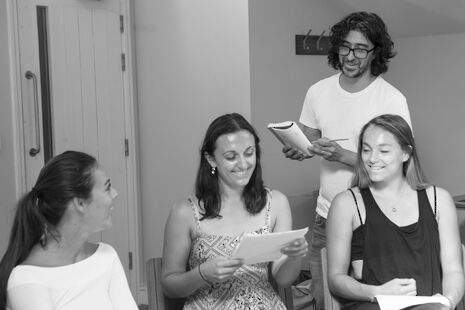Review: The Cambridge Greek Play 2016
Frances Myatt was hugely impressed the Cambridge Greek Play Committee’s two muscular performances in the original Greek

Take two plays, not forgetting to include three suicides and a sex strike, wait 2,500 years, add some freshly composed music, several roles of barbed wire, and as many pink feathers as possible, then throw in Donald Trump and Boris Johnson tap dancing, and what do you get? The Cambridge Greek Play, of course!
Every three years Cambridge classicists and thespians take part in a Greek play in the original language, and the 2016 production certainly does not disappoint. Particularly impressive was that the same actors played both the tragedy Antigone, in which Creon orders Antigone’s execution and accidentally causes the suicides of his son and wife, as well as the raucous comedy Lysistrata, in which Lysistrata persuades the women of Athens and Sparta to take part in a sex strike, forcing their husbands to stop the war. So for example Orlando Gibbs, speaking in wonderfully natural Greek, sobbed over the bodies of his wife and son in a emotional interpretation of the part of Creon, and then 20 minutes later as the Spartan messenger, replete with fake tan, blond wig and strong American accent, proclaimed ‘nobody has more respect for women that me’, before rubbing light sabers with the Athenian Magistrate, a.k.a a certain foreign secretary, also sporting a blond wig and played with great gusto by Zak Ghazi-Torbati. It was hard to tell whether the pair were getting more cheers or boos, but there was certainly plenty of noise from the audience.
Even more impressive (if that were possible) is that the actors did not only perform both tragedy and comedy in ancient Greek, but they were also all sang as well. Jack Hawkins in particular, as he blind seer Teiresias, sang his prophecy of doom to Creon in the most hauntingly high pitched operatic tones, while the chanting of the chorus in Antigone sent shivers down your spine. Indeed the singing, music (composed by Alex Silverman and performed by a live orchestra) and acting were all uniformly excellent – there really was too much talent to pick out every impressive actor.
The use of lighting and props was extremely sophisticated while the same set, with barbed fences and piles of rubble, was used to depict both Thebes in Antigone and the Athenians acropolis in Lysistrata, which drew interesting parallels between the two war torn cities. I did think it might have been even more effective if Antigone, movingly played by Evie Butcher, could have been dressed in a feminine costume and appealing for her life to an all male chorus, to heighten her position as a long young woman, persecuted by the male political elite who send her to death instead of to her marriage bed. This would then have brought out the contrast between the fate of Antigone and the victorious women of the Lysistrata even futher – but that really is just me being extremely picky, as I can rarely remember enjoying a performance more.
For those of us not fluent in ancient Greek an English translation was displayed on a board above the stage, which in the Lysistrata was also used to make witty little comments on certain aspects of the script. Particularly memorable was the moment when the male chorus, about to attack the women on the Acropolis, say ‘let us strip for action’ – then look in amazement at the translation on the board, which tells them ‘yes, that’s what the ancient Greek says!’ – and, lo, half a dozen pairs of union jack boxers are duly revealed to a helplessly giggling audience. Can you believe you ever thought Classics was boring? Overall, a very strong production from a very strong cast, and most certainly worth a watch.
 Features / Are you more yourself at Cambridge or away from it? 27 January 2026
Features / Are you more yourself at Cambridge or away from it? 27 January 2026 Interviews / Lord Leggatt on becoming a Supreme Court Justice21 January 2026
Interviews / Lord Leggatt on becoming a Supreme Court Justice21 January 2026 News / Reform candidate retracts claim of being Cambridge alum 26 January 2026
News / Reform candidate retracts claim of being Cambridge alum 26 January 2026 News / Vigil held for tenth anniversary of PhD student’s death28 January 2026
News / Vigil held for tenth anniversary of PhD student’s death28 January 2026 News / Stand Up To Racism protests in solidarity with Minneapolis marches28 January 2026
News / Stand Up To Racism protests in solidarity with Minneapolis marches28 January 2026









